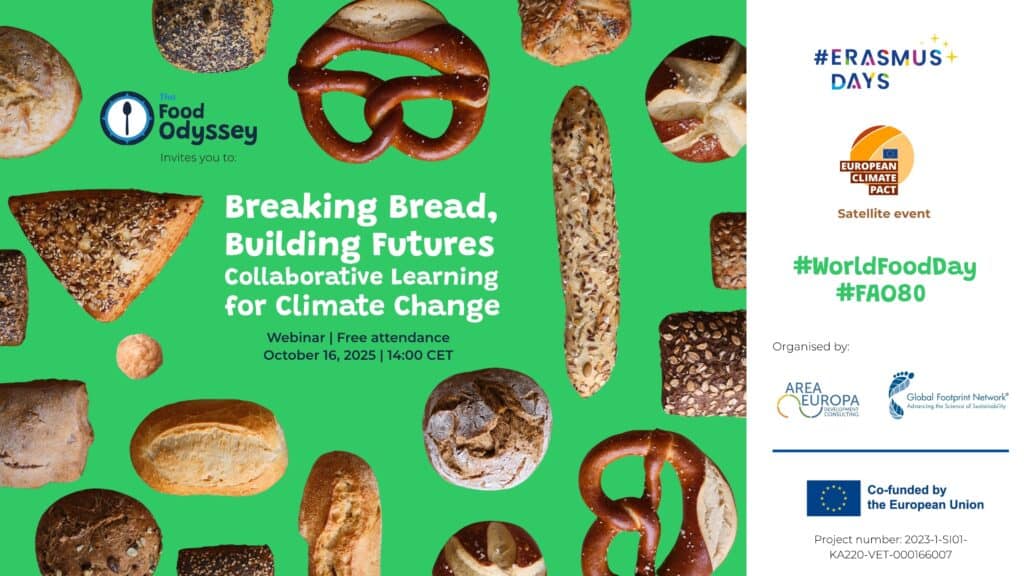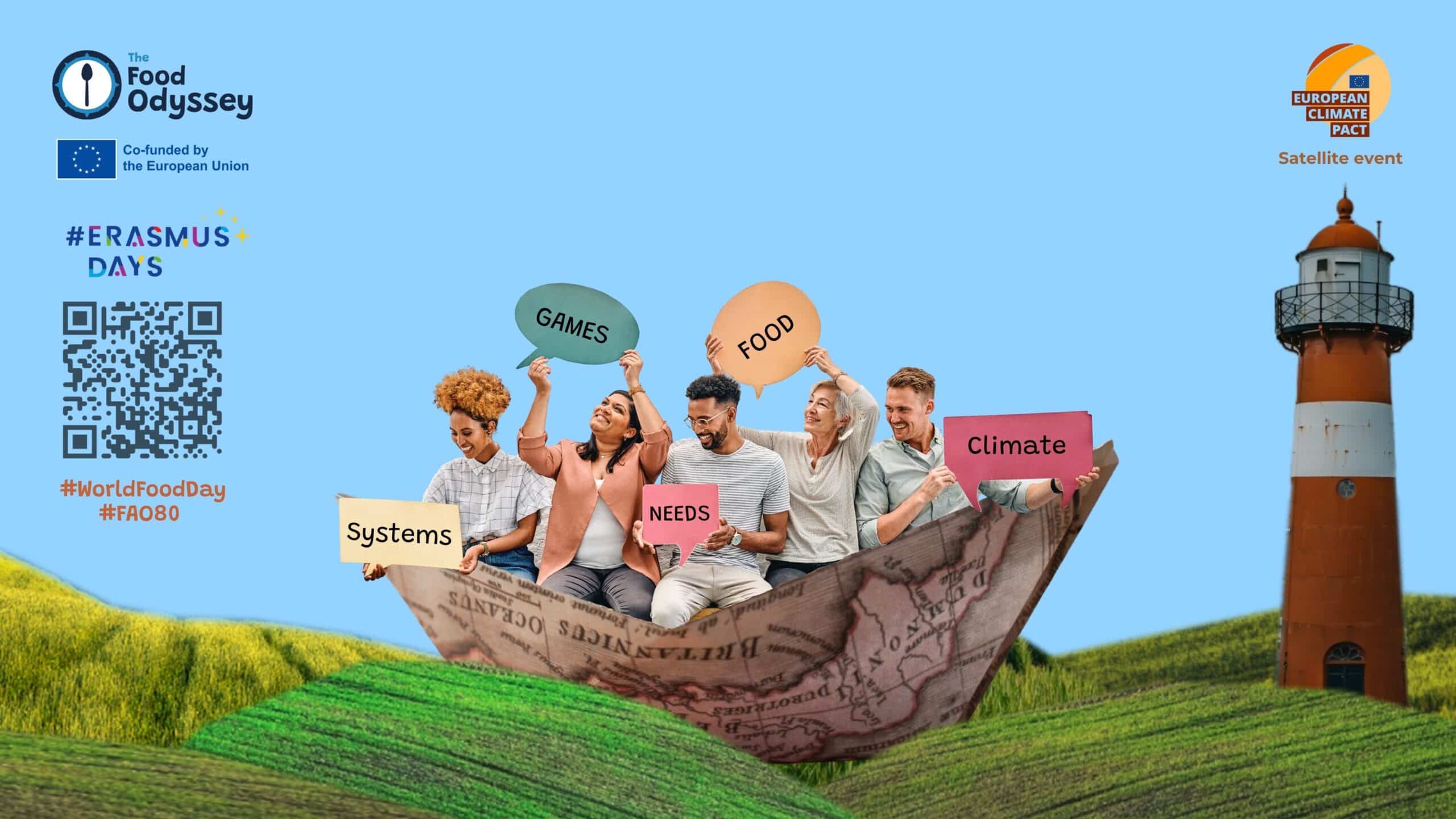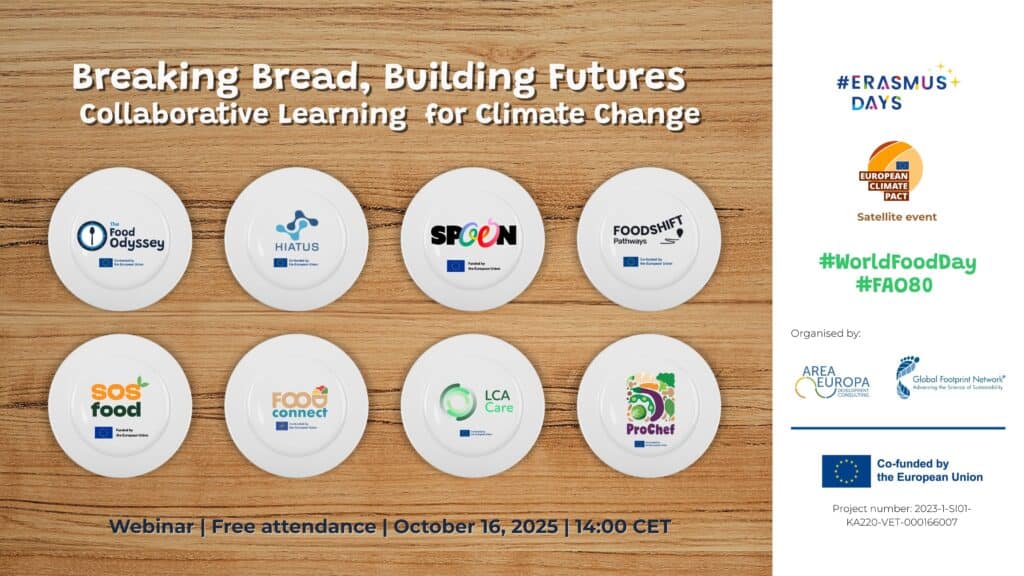by Juliana Carvalho, Maria Elisa Zuppiroli, and Giulia Lombardo Pijola
What if tackling climate change started with sharing a meal?
Or at least the idea of one?
That was the spirit behind Breaking Bread, Building Futures, an online event co-organised by Area Europa and Global Footprint Network as part of The Food Odyssey project.
Held on 16 October 2025, to celebrate World Food Day, the webinar brought together European initiatives working at the intersection of food, climate, and education.
Featured as a European Climate Pact Satellite Event, an Erasmus Days event, and included on the FAO interactive World Food Day map and on the Education for Climate platform, the session gathered two dozen participants online for one shared purpose: to learn, exchange, and imagine together how education can empower communities to act for a sustainable food future.
A table set for collaboration
“By breaking bread together in this virtual space, we aim to connect projects, spark new synergies, share good practices, and explore how education can empower communities to act,” explained Giulia Lombardo Pijola, president of Area Europa, who hosted the meeting.
Check out the short presentations that set the stage, followed by an open discussion, a recipe for shared insight and new alliances.
 Who joined the table
Who joined the table
The host: The Food Odyssey – an Erasmus+ KA2 VET education project that combines storytelling, play, and innovation to teach about sustainable food systems through game-based learning.
SPOON – a Horizon project connecting citizens, researchers, industries, civil society organisations, and policymakers to co-create a fairer, healthier, and more sustainable food future.
FOODSHIFT Pathways – an Erasmus+ KA2 School Education project helping schools drive food system transformation through creative STEAM learning and real-world action.
SOSFood Project – a Horizon project working to make our food systems more sustainable and secure, harnessing the potential of Artificial Intelligence technologies.
HIATUS – an Erasmus+ KA2 School Education project that implemented the “service design thinking” methodology within schools, in close cooperation with teaching staff.
PROchef project – an Erasmus+ KA2 VET project aimed at enhancing the skills of chefs and kitchen staff in the context of promoting a protein shift in institutional kitchens.
LCA CARE – an Alliances Partnerships for Innovation project, focused on fostering eco-innovation in SMEs within the agri-food sector.
FoodConnect – LIFE programme project designed to address the critical issue of food waste in the Southern EU region
Shared insights from the table
The discussion revealed how diverse approaches to food system transformation can reinforce one another. Three key themes emerged: making complexity tangible through creative learning, harnessing data and technology for systemic change, and building bridges across sectors.
“The Breaking Bread event provided an excellent platform for inspiring projects to exchange best practices and explore opportunities for collaboration — elements that lie at the heart of European projects and are essential for achieving systemic transformation together.”
— Beatrice Meo, Hot or Cool Institute (SPOON Project)
“We aim to reach actors across the entire food value chain and gather data from each step. The use of AI-based technologies and the access to private, underexploited or unused data will allow us to upgrade the decision-making processes and create more efficient, sustainable systems that are fair to everyone.”
— Eloy Miranda García, SOSFood Project
Katerina Riviou, from FOODSHIFT Pathways, surprised the audience by sharing another inspiring initiative, the CLEVERFOOD project, and its travelling “CLEVERFOOD for Everyone” exhibition, which brings the complexity of global food systems to life across Europe.
Perhaps the most powerful thread running through all presentations was the recognition that transformation requires working across boundaries—between sectors, disciplines, and communities.
This collaborative and creative spirit—open, curious, and grounded in shared learning—was exactly what the event celebrated.
Because sharing ideas, like sharing food, brings us closer to building the futures we want.
Missed the session?
You can watch the recording here and explore how education is shaping tomorrow’s food systems.
Want to keep the learning going?
Explore The Food Odyssey’s Teachers’ Toolkit, a set of ready-to-use slide decks designed to help teachers (and anyone curious) learn about sustainability and food systems, and bring these topics into the classroom.




